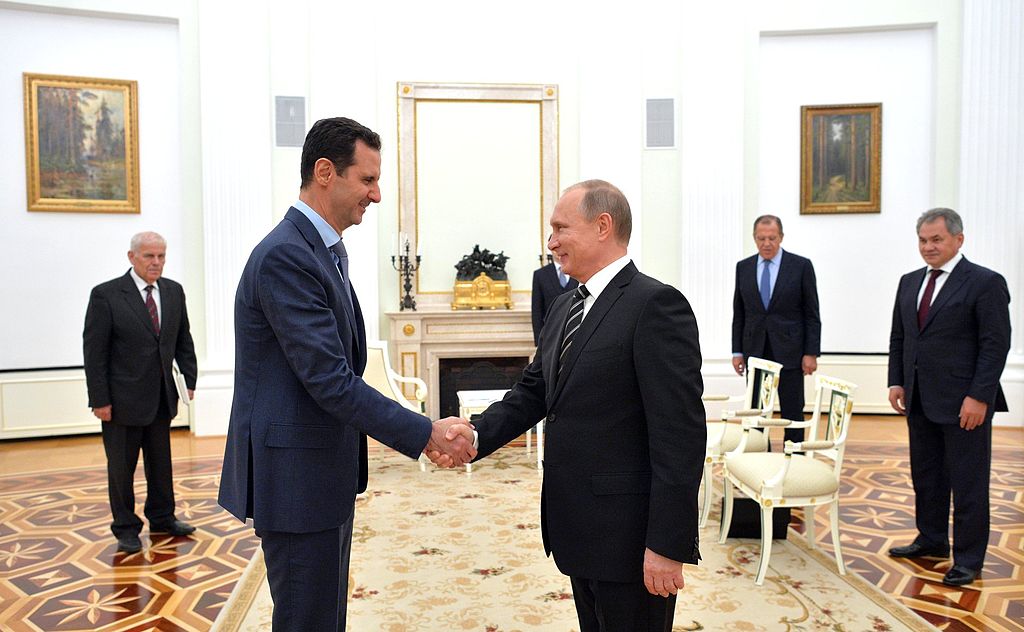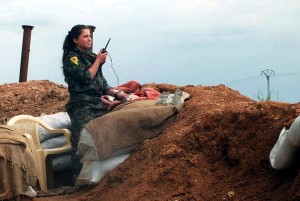by Mark N. Katz
Many observers have already pointed out how the latest U.S.-British-French attack on three of the Assad regime’s chemical weapons facilities has not done much to harm the Assad regime. Indeed, it has not even ended Assad’s ability to launch further chemical weapons attacks against his internal opponents in the future, after rebuilding his fabrication facilities—if not sooner if he has further stores of these weapons. Yet even if the Trump Administration (despite its claims of “mission accomplished”) might not have gained much from its recent action against Syria, this event also shows the limits of Russia’s influence over the situation there.
Certain Russian officials—though not Putin or his other top level associates—warned that Russian armed forces could respond to a Western attack on Syria not only by intercepting Western missiles, but also attacking the platforms from which they were launched. Not only did these threats fail to deter a Western missile attack, but Russian forces did not attempt to intercept them—much less attack their launch sites. It is possible that Russian threats served to limit the scope of the American-led attack, as well as to promote some degree of communication between Washington and Moscow to ensure that Russian forces in Syria would not be in harm’s way. On the other hand, by raising the prospect of a forceful Russian response to a Western missile attack on Syria but not following through on it, Moscow has, in fact, demonstrated that it is willing to tolerate Western attacks on the Assad regime’s chemical weapons facilities.
Why would Moscow do this? One possibility is that it well understands that these Western attacks would not have occurred if the Assad regime had not attacked its opponents with chemical weapons in the first place. Considering how much effort Putin put into working with the Obama Administration on a process that supposedly removed all chemical weapons from Syria, the fact that Assad has subsequently launched such attacks has undoubtedly embarrassed Putin because they show how little influence Moscow has over him. Further, with Assad now winning the war with his internal opponents (thanks to Russian and Iranian support), his use of chemical weapons against them is not just unnecessary, but counterproductive since it invites Western military retaliation, which the use of conventional force against Assad’s opponents does not.
Moscow has presumably made this point to the Assad regime, and yet (notwithstanding their less than credible denials) Damascus has gone ahead with such attacks anyway. Why Assad would do so may be due in part to sheer vindictiveness, but also to his calculation that Moscow will come to his aid even if he does not heed its advice. While Moscow and Washington do not want to see a direct clash between Russian and American forces, Assad may be far more willing to allow this to occur if it means greater Russian support for him.
And why would Assad want this? One reason is that Assad is especially unhappy that Moscow has adopted an accommodating attitude toward Turkey’s intervention in northwestern Syria. Moscow may hope that accommodating Turkey in its fight against the U.S.-backed Syrian Kurdish forces will contribute to the further deterioration of Turkish-U.S. relations, but Damascus simply wants Turkish forces to leave its territory. Another is that while Moscow wants Assad to make some concessions to his opponents in the Russian-sponsored Astana peace process, Damascus does not want to make any at all—especially now that it sees itself as winning.
Assad may well have anticipated that attacking his opponents with chemical weapons would lead to an American military response that would not threaten his regime’s survival, but that Moscow would strengthen its support for him as well as reduce what pressure it was applying on him to make concessions to his opponents. But if Moscow sensed that this was how Assad was attempting to manipulate Russia, it is not surprising that it did nothing to stop the Western attack on his chemical weapons facilities. Indeed, Putin might actually be relieved if Trump really could put an end to Assad’s ability to deploy them. But this, as even American military officials have indicated, was not achieved. So unless Putin somehow manages to persuade or coerce Assad into halting his practice of attacking his opponents with them, it is highly likely that a similar crisis over Assad’s use of chemical weapons will occur again all too soon.






While much of what Mark Katz writes makes sense, IMHO he misses key points. The objective of Assad’s military was to complete the takeover of the rebel enclave, which has taken them too long. This last attack, including use of spiked chlorine, did the trick. The whole devastated area is now back in the government’s control. And that result is in the Russian military’s interest also; shutting down the civil war by overcoming the remaining rebel-held areas is just what they want to see. What the Americans might think or want is second order stuff. But the Russian military understood that Trump was going to do something, so one can imagine the two militaries schemed together to devise the minimal thing that would allow him to proclaim, “Mission accomplished.” And it worked! My hat goes off to Sec. of Defense Mattis for bringing that about.
James Larrimore, I agree. The Army of Islam was inflicting substantial casualties on the elite Syrian Panther Brigade during the Douma takeover two weeks ago. And afterwards they refused to surrender and wanted to work out a deal to remain there. Assad wanted all the rebel bases near the capital completely gone and so did Russia. Everyone’s mission was accomplished except for the real trouble maker, Israel.
The Problem with Katz’s analysis is that he simply assumes that Assad — for reasons that go beyond rationality — used and seeks to use chemical weapons without questioning this assumption. Now it’s possible he used them against pockets of identifiable Islamic radicals early on, but after 2013 (and the Russian/U.S. cooperative removal of Syrian Chem Weapons), highly unlikely.
Katz completely ignores (or is unaware of) long tracked evidence that various Jihadi groups — the key Sunni extremist fighters against the regime who have been alternatively and regularly funded, supported and trained by the Saudis, the Qataris, Turkey, Israel, the U.S. Britain, the CIA and MI6, etc. — have been heavy “users” of chemical weapons in Syria. In key instances: Ghouta 2013 “red line” incident, Investigative Journalist Seymour Hersh and other investigators found that the “sarin gas” rockets (because of their range and the distances involved) could only have come from “rebel” controlled areas . . . even James Clapper couldn’t “confirm” that Assad was the perpetrator of the attack and, given Brit parliamentary hesitance, Obama backed off . . . Khan Shaykhun in 2017 . . . people showed up at hospitals before the attack supposedly took place, the “White Helmet’s” videos were obviously faked, MIT Technical National Security and Science Professor Theodore Postol did an after the fact multi-pronged forensic analysis debunking the assertion of Regime responsibility, etc. Douma 2018 . . . no evidence has been found that a “gas attack” even occurred, despite “iffy” (again by Brit funded Islamic extremist “White Helmets” videos magically appearing at the main western press news outlets).
An important logical point that Katz touches on (but then abandons, preferring a ridiculous and absurd counter intuitive alleged scenario by Assad using “gas” to pressure his Russkie allies) is that when you’re winning a war, using gas — given it’s stigma, even tho the vast majority of deaths in the war are from conventional weapons — that would trigger aggressive responses attacking your country by the most militarily powerful nation on earth and its “Euro toadies” is really stupid. Now neither Assad nor his Russian allies are “stupid.”
Katz doesn’t seem to realize the extent of daily (if not hourly over the last couple weeks) “de-confliction” communications between the heads of the American Military and the Russian Defense Ministry that led to “ameliorations” and “adjustments” of the U.S., Brit, and French missile attack plans. Neither does he bother to look at the many reports from multiple sources that the “West” targeted more than just 3 anodyne abandoned “chemical” installations, and that 4 or 5 military airports were targeted as well. Interestingly, according to Russian, Syrian and other credible sources on the ground covering the Syrian War, roughly three quarters of the over 100 cruise missiles launched at Syria were intercepted. The U.S. Military claims all missiles hit only three targets. So there’s a wide discrepancy in the reporting of what actually happened, which definitely calls for further investigation.
A lot of reasonable assumptions but all based on a myth of ‘chemical attack’. What a scholar methodology!
I completely agree with the comments made by Richard Gabrio , I think the notion that someone winning big jupardizing his achievement with such a counterproductive and totally unnecessary action is incomprehensible . Imagine this : a football player playing American football runs with the ball , he is one yard short of a touch down suddenly he decides to stop and run backwards ! It does not make sense . On the other hand , the losing side about to be wiped out what is more logical than creating a “false flag “ operation thus laying the blame on the wrong side and getting it clobbered . This the only scenario that makes sense to me . Dr Asad the president of Syria is already in control of almost all his country so why would he bring the wrath of the international community on his head ? Much more likely the other side did .
I was flabbergasted however to learn that the Russians have left Syria with antiquated air defenses dating back to the Soviet Era , the fact that those defenses succeeded in shooting down Un unverified number of missiles speaks more of the ineffectiveness of these missiles than to the prowess of Syrian defenses . I would have expected that Syria would have received the latest in Russian defensive technology such as the S400 rather than leaving the Syrians to their fate . Alternatively Syria should have been put under the Russian air defense umbrella